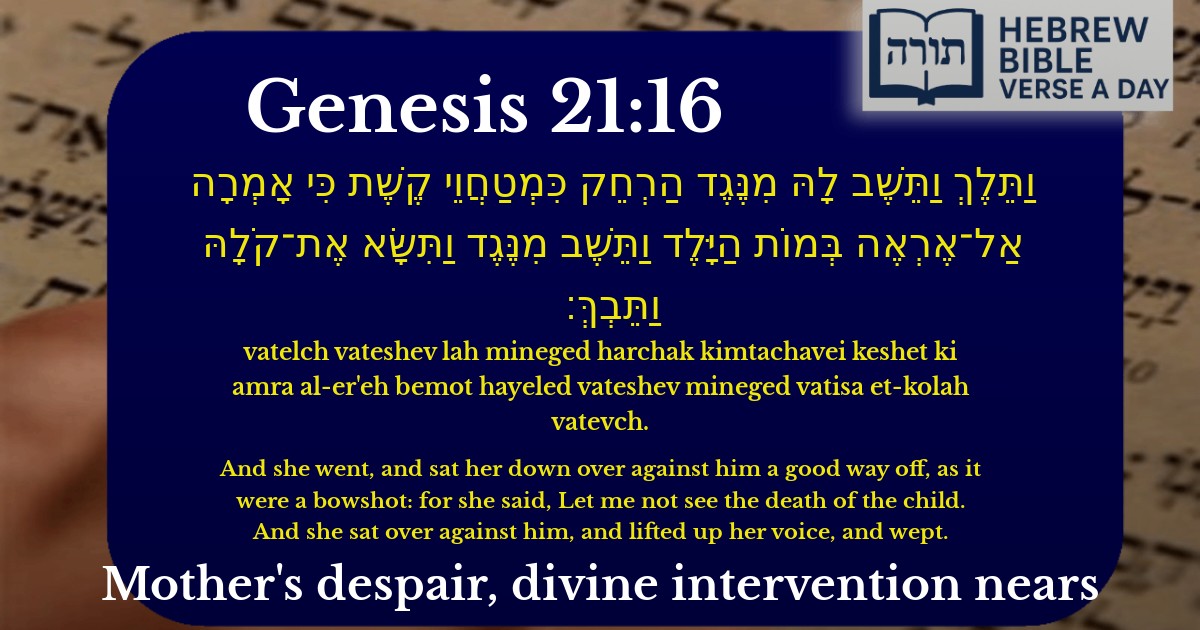Join Our Newsletter To Be Informed When New Videos Are Posted
Join the thousands of fellow Studends who rely on our videos to learn how to read the bible in Hebrew for free!
Hebrew Text
וַתֵּלֶךְ וַתֵּשֶׁב לָהּ מִנֶּגֶד הַרְחֵק כִּמְטַחֲוֵי קֶשֶׁת כִּי אָמְרָה אַל־אֶרְאֶה בְּמוֹת הַיָּלֶד וַתֵּשֶׁב מִנֶּגֶד וַתִּשָּׂא אֶת־קֹלָהּ וַתֵּבְךְּ׃
English Translation
And she went, and sat her down over against him a good way off, as it were a bowshot: for she said, Let me not see the death of the child. And she sat over against him, and lifted up her voice, and wept.
Transliteration
Vatelch vateshev lah mineged harchak kimtachavei keshet ki amra al-er'eh bemot hayeled vateshev mineged vatisa et-kolah vatevch.
Hebrew Leining Text
וַתֵּ֩לֶךְ֩ וַתֵּ֨שֶׁב לָ֜הּ מִנֶּ֗גֶד הַרְחֵק֙ כִּמְטַחֲוֵ֣י קֶ֔שֶׁת כִּ֣י אָֽמְרָ֔ה אַל־אֶרְאֶ֖ה בְּמ֣וֹת הַיָּ֑לֶד וַתֵּ֣שֶׁב מִנֶּ֔גֶד וַתִּשָּׂ֥א אֶת־קֹלָ֖הּ וַתֵּֽבְךְּ׃
וַתֵּ֩לֶךְ֩ וַתֵּ֨שֶׁב לָ֜הּ מִנֶּ֗גֶד הַרְחֵק֙ כִּמְטַחֲוֵ֣י קֶ֔שֶׁת כִּ֣י אָֽמְרָ֔ה אַל־אֶרְאֶ֖ה בְּמ֣וֹת הַיָּ֑לֶד וַתֵּ֣שֶׁב מִנֶּ֔גֶד וַתִּשָּׂ֥א אֶת־קֹלָ֖הּ וַתֵּֽבְךְּ׃
🎵 Listen to leining
Parasha Commentary
📚 Talmud Citations
This verse is not quoted in the Talmud.


Context of the Verse
This verse (Genesis 21:16) describes Hagar's reaction after being sent away by Avraham at Sarah's request. Hagar and her son Yishmael are in the wilderness, and Yishmael is near death from thirst. The verse captures Hagar's anguish as she distances herself to avoid witnessing her son's suffering.
Rashi's Explanation
Rashi (Rabbi Shlomo Yitzchaki) comments on the phrase "כִּמְטַחֲוֵי קֶשֶׁת" ("as it were a bowshot"):
Midrashic Insights
The Midrash (Genesis Rabbah 53:13) elaborates on Hagar's emotional state:
Rambam's Perspective
While Rambam (Maimonides) does not comment directly on this verse, his teachings on hashgacha pratit (divine providence) in Moreh Nevuchim (3:17) can be applied:
Symbolism of the Bowshot
The Talmud (Bava Batra 73a) and later commentators explore the metaphor of the bow: